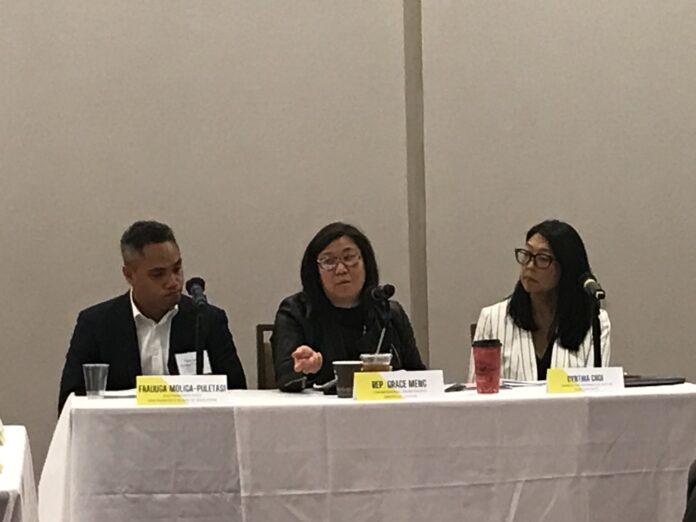by Akemi Tamanaha, AsAmNews Associate Editor
Congresswoman Grace Meng (D-NY) joined local community leaders for a roundtable discussion on anti-Asian hate at the Chinese Cultural Center in San Francisco this Saturday.
“From Community to Congress: A Stop AAPI Hate Roundtable Dialogue” was sponsored by Stop AAPI Hate, the Congressional Asian Pacific American Caucus (CAPAC) and The Asian American Foundation (TAAF). The Chinese Cultural Center hosted at their auditorium in San Francisco’s Chinatown.
Panelists included several local community leaders from San Francisco. California Attorney General Rob Bonta, San Francisco Attorney David Chiu, San Francisco Supervisor Connie Chan and San Francisco Supervisor Gordon Mar gave opening remarks.
Speakers applauded the work that has already been done in local communities and in Congress. Russell Jeung presented data that Stop AAPI Hate has been collecting over the past two years. Meng received praise for her work to pass the COVID-19 Hate Crimes Act in Congress.
LATEST STORIES
But each panelist acknowledged that there is still a long road ahead. Rep. Meng said it was important to continue building on the work Stop AAPI Hate has done to document anti-Asian hate incidents.
“We have to pay attention to numbers because they’re important,” she said. “We can’t fix a problem, we can’t mend a problem until we can measure it.”
Unity and Intersectionality
Unity was an idea that was repeatedly emphasized throughout the roundtable.
“You know we’ve also seen…racial profiling and blaming of other communities of color for this problem that really sets us back as a community and as a society,” Supervisor Mar said.
He pointed out that other communities of color are also facing the same struggle with increasing hate crimes. According to Mar, data shows that African Americans are the most targeted by hate crimes in San Francisco and California.
Jon Osaki, the Executive Director of the Japanese Community Youth Council (JCYC), recalled a time when father would work together with members of the Black community to fight against discriminatory policies adopted during Ronald Reagan’s time as governor of California. He has also found it beneficial to work with other communities of color at JCYC
“Rather than make communities compete with each other for resources that we think about ways where we can support them to work together,” he said.

Supervisor Chan added that it was important to have conversations that address the diversity within the Asian American community.
Faauuga Moliga-Puletasi, a member of the San Francisco Democratic County, and Gaynorann Siataga spoke specifically about how the Pacific Islander community faces different forms of hate and violence. Siataga noted that Pacific Islanders are often judged because of their body types and skin tones. People view them as the bullies.
According to both Moliga-Puletasi and Siataga, the Pacific Islander community faces more gun violence than other groups. They stand in solidarity with other members of the AAPI community but want to find a way to address the specific issues Pacific Islanders face.
“How do we look at it on a spectrum to be able to address each issue,” Moliga-Pulateasi said.
Solutions
Several speakers asked that long-term solutions not center around law enforcement.
“We’ve seen a strong community sentiment, that’s very understandable, in focusing on simplistic solutions to these problems: increased law enforcement and incarceration,” Supervisor Mar said. “That’s very understandable but I think everyone here understands that it’s going to take more than increased law enforcement to really address these troubling issues.”
Members of law enforcement are sometimes the harassers. Zahra Billoo, Executive Director of the Council on American-Islamic Relations, San Francisco Bay Area (CAIR-SFBA), said last year her organization received twice as many complaints about law enforcement as they did about hate incidents with regular civilians.
Sarah Wan, executive director of Community Youth Center, and Shaw San Liu, Organizing Director at Chinese Progressive Association, presented alternative solutions that focused on victims’ services, restorative justice and education.
Wan said their is a need to increase access to victims’ services already provided by the government. While the government does provide services in some Asian languages, there are not enough translators to cover other languages and dialects.
There are also ways the government can expand its services. Right now, local governments provide services for hate crime victims who are physically injured. Wan believes local governments should provide mental health resources for victims who are mentally traumatized.
Liu advocated for solutions that address systemic racism and poverty.
Rep. Meng said she would be taking what she learned from the round table back to Washington D.C. with her.
“I’m really here to listen,” Meng said. “I’m already taking notes on ways that we can bring back to Washington, and also selfishly to my home state of New York, ways that the community organizations have worked together on the ground really in unprecedented ways.”

AsAmNews is incorporated in the state of California as Asian American Media, Inc and has an application for non-profit 501c3 status with the IRS pending. Check out our Instagram account. Go to our Twitter feed and Facebook page for more content. Please consider interning, joining our staff, or submitting a story, or making a financial contribution. We are committed to the highest ethical standards in journalism. Please report any typos or errors to info at AsAmNews dot com.








